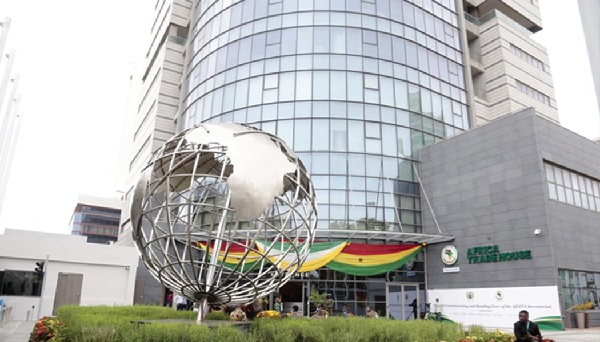
Single Africa market under threat — Former Minister questions AfCFTA relevance
AN economist and former Deputy Finance Minister, Kwaku Kwarteng, has revived the debate on how realistic it is to have a single market under the African Continental Free Trade Area (AfCFTA) agreement.
He said the dream of having a single market, free of borders to boost intra African trade might never become a reality because many African economies have similar characteristics.
The MP also brought to the fore the fact that the countries trade in almost the same goods and services, a situation which he said makes integration very difficult.
In an interview with the media on the sidelines of a meeting between the Private Enterprise Federation (PEF) and some members of the Finance Committee in Parliament, Mr Kwarteng, who is also the Chairman of the Finance Committee in Ghana’s Parliament, said although the agreement might sound good and beautiful on paper, it seemed not to make economic sense for some African countries.
Agreement
The AfCFTA agreement is expected to create the largest free trade area in the world measured by the number of countries participating.
The pact is meant to connect 1.3 billion people across 55 countries with a combined gross domestic product (GDP) valued at US$3.4 trillion.
It has the potential to lift 30 million people out of extreme poverty, but in achieving its full potential, many experts believe it will depend on putting in place significant policy reforms and trade facilitation measures.
Mr Kwarteng also raised other cogent questions, saying: “Integration is good but it can come with a lot of hazards, and especially when you are integrating similar economies.
In Ghana for instance, the machinery we need for our industrialisation agenda does not come from other African countries, they come from Europe.”
He further noted for instance that other African countries have what Ghana already has, adding that: “We all have the same things and when two countries have similar characteristics, trying to put them together as one trade partner is unrealistic.
It may sound beautiful and pan Africanists will say one Africa but in reality when economies begin to bite, you want to trade with somebody who lacks what you have and you also lack what they have,” he explained.
More complicated
Mr Kwarteng said the AfCFTA agreement was much more complicated than expected.
He said there was the need for the continent to have a common external tariff before finance ministers and presidents would be encouraged to allow for free movement of goods and services.
“We should begin to engage on the AfCFTA common external tariff because if the tariffs are different across various countries, we will not know whether Ghanaian companies will be advantaged or disadvantaged,” he explained.
No meaningful trade
Mr Kwarteng’s observations comes at a time when any meaningful trade is yet to happen under AfCFTA despite its official launch some four years ago.
Although it was expected that full implementation of the agreement would happen in the first quarter of 2023, that is yet to happen.
The AfCFTA agreement was adopted and opened for signature in 2018 and entered into force in May 2019. The launch of the agreement in 2019 saw about 14 African countries signing up for the agreement instantly, which was a demonstration of the commitment of African countries to trade among themselves.
As of June 2022, 54 countries had signed the agreement, with 44 of them submitting their instrument of ratification.
However, it appears these African countries have not demonstrated the same commitment towards submitting their tariff guidelines, which would pave way for the full implementation of the agreement.
For exports to start under the agreement, there is the need to negotiate various protocols. The elements of trade are basically two, goods and services. There were two critical protocols that had to be negotiated, one on goods, and the other on services.
The launch of exports under AfCFTA was on January 1, 2021, which opened up the way for negotiations to be completed. The target was that when negotiations were 90 per cent complete, trading could start.
By June last year, negotiations were 87 per cent complete and the Ministers of Trade that met in Accra decided that trading could start.
This was, however, not possible as many of the countries that have signed and ratified the agreement were yet to submit their tariff guidelines.
If the countries who had ratified the agreement do not submit their tariff schedule of commitment, then exports could not be made into those countries.
At the Africa Prosperity Dialogues last month, the Secretary General of the AfCFTA Secretariat, Wamkele Mene, said AfCFTA e-Tariff Book rules of origin manual would soon be ready to aid the full implementation of the agreement.